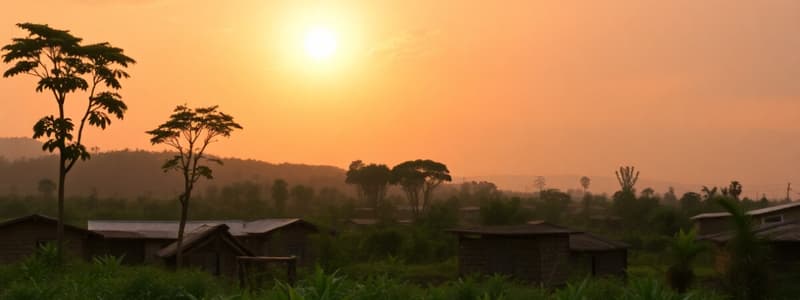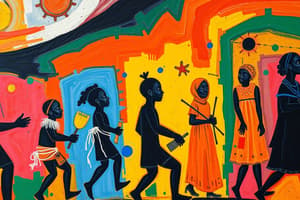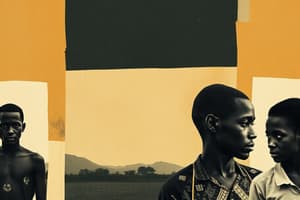Podcast
Questions and Answers
Which group made up 85% of the Rwandan population prior to colonialism?
Which group made up 85% of the Rwandan population prior to colonialism?
- Germans
- Belgians
- Hutus (correct)
- Tutsis
The Tutsis were primarily laborers and had lower status in Rwandan society.
The Tutsis were primarily laborers and had lower status in Rwandan society.
False (B)
What significant event in 1994 led to the genocide in Rwanda?
What significant event in 1994 led to the genocide in Rwanda?
The shooting down of President Juvenal Habyarimana's plane.
The Belgian colonial government required all Rwandans to carry identification cards marked with their ________ or ________ status.
The Belgian colonial government required all Rwandans to carry identification cards marked with their ________ or ________ status.
Match the events with their outcomes in Rwanda:
Match the events with their outcomes in Rwanda:
Which external force had peacekeepers in Rwanda during the genocide?
Which external force had peacekeepers in Rwanda during the genocide?
Hutu militants were blameless in the events leading up to the genocide.
Hutu militants were blameless in the events leading up to the genocide.
What resulted from the economic issues faced by the Hutu government in the 1980s?
What resulted from the economic issues faced by the Hutu government in the 1980s?
Radio broadcasts during the genocide encouraged Hutus to take ________ against Tutsis.
Radio broadcasts during the genocide encouraged Hutus to take ________ against Tutsis.
What impact did Belgian and German colonial rule have on Rwanda's society?
What impact did Belgian and German colonial rule have on Rwanda's society?
What was the purpose of the gacaca courts established in Rwanda in 2002?
What was the purpose of the gacaca courts established in Rwanda in 2002?
The demographic ratio of black people to white people in South Africa was approximately 10 to 1.
The demographic ratio of black people to white people in South Africa was approximately 10 to 1.
During which event did police open fire on protesting high school students in Soweto?
During which event did police open fire on protesting high school students in Soweto?
In South Africa, citizens were categorized into groups such as Asian, white, colored, and _______.
In South Africa, citizens were categorized into groups such as Asian, white, colored, and _______.
Match the following historical contexts with their descriptions:
Match the following historical contexts with their descriptions:
What was the reaction of the South African government to protests against apartheid?
What was the reaction of the South African government to protests against apartheid?
The United Nations set up a court in Rwanda to try low-ranking officials for genocide.
The United Nations set up a court in Rwanda to try low-ranking officials for genocide.
What year did apartheid begin to be enforced in South Africa?
What year did apartheid begin to be enforced in South Africa?
In Rwanda, the gacaca courts were often referred to as '______ on the grass'.
In Rwanda, the gacaca courts were often referred to as '______ on the grass'.
Match the following events with their outcomes:
Match the following events with their outcomes:
Flashcards
Apartheid
Apartheid
A system of racial segregation and discrimination enforced by law in South Africa from 1948 to 1994.
Gacaca courts
Gacaca courts
A court established in Rwanda in 2002 to address war crimes and genocide committed during the 1994 Rwandan genocide.
Reconciliation
Reconciliation
The process of bringing justice and healing to a society after a conflict or atrocity.
Rebuilding society
Rebuilding society
Signup and view all the flashcards
Racial segregation
Racial segregation
Signup and view all the flashcards
Genocide
Genocide
Signup and view all the flashcards
Soweto Uprising
Soweto Uprising
Signup and view all the flashcards
African independence movement
African independence movement
Signup and view all the flashcards
Imperialism
Imperialism
Signup and view all the flashcards
International tribunal
International tribunal
Signup and view all the flashcards
Scramble for Africa
Scramble for Africa
Signup and view all the flashcards
Colonialism
Colonialism
Signup and view all the flashcards
Racial Superiority
Racial Superiority
Signup and view all the flashcards
German Colonization of Rwanda
German Colonization of Rwanda
Signup and view all the flashcards
Belgian Mandate in Rwanda
Belgian Mandate in Rwanda
Signup and view all the flashcards
Racial Classification System
Racial Classification System
Signup and view all the flashcards
Rwandan Genocide
Rwandan Genocide
Signup and view all the flashcards
International Community's Inaction During the Rwandan Genocide
International Community's Inaction During the Rwandan Genocide
Signup and view all the flashcards
Hate Propaganda
Hate Propaganda
Signup and view all the flashcards




